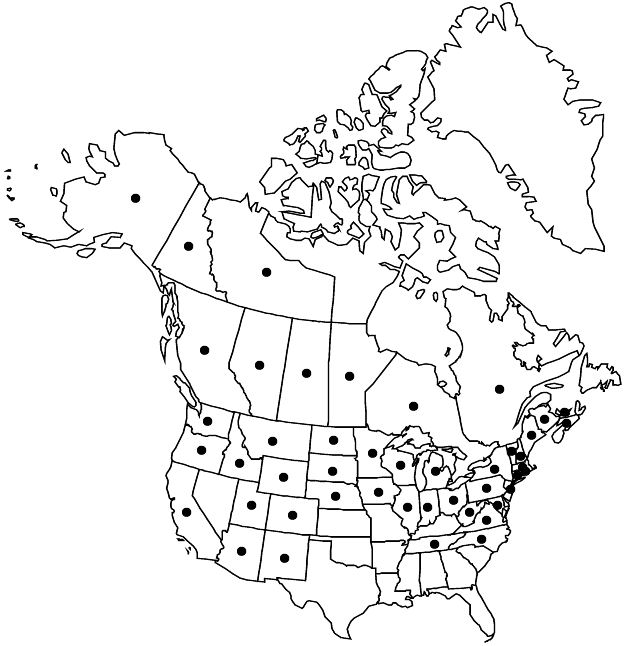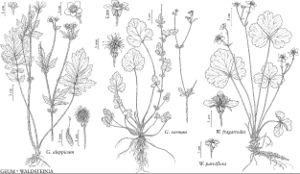Geum aleppicum
Collectanea 1: 88, plate 127. 1787.
Plants leafy-stemmed. Stems 30–120 cm, hirsute to sparsely hirsute. Leaves: basal 10–35 cm, blade interruptedly pinnate, major leaflets 5–9, alternating with 4–6 minor ones, terminal leaflet usually only slightly larger than major laterals; cauline 4–19 cm, stipules ± free, 8–28 × 5–22 mm, blade pinnate to 3-foliolate. Inflorescences 3–7-flowered. Pedicels puberulent, hirsute, eglandular. Flowers erect; epicalyx bractlets 2–3.5 mm; hypanthium green; sepals erect but soon reflexed, 4–8 mm; petals spreading, yellow, nearly orbiculate to broadly ovate or obovate, 5–9 mm, equal to or slightly longer than sepals, apex rounded, occasionally irregularly notched. Fruiting tori on 2–3 mm stipes, densely downy, hairs soft, 0.3–0.7 mm. Fruiting styles geniculate-jointed, proximal segment persistent, 3–6 mm, apex hooked, bristles on basal 1/3, eglandular, distal segment deciduous, 1–2 mm, pilose in basal 1/2, hairs much longer than diam. of style. 2n = 42.
Phenology: Flowering summer.
Habitat: Moist habitats, meadows, stream banks, alluvial thickets, swamps, forests, clearings, ditches, roadsides
Elevation: 0–2600 m
Distribution

Alta., B.C., Man., N.B., N.W.T., N.S., Ont., P.E.I., Que., Sask., Yukon, Alaska, Ariz., Calif., Colo., Conn., Idaho, Ill., Ind., Iowa, Maine, Md., Mass., Mich., Minn., Mont., Nebr., N.H., N.J., N.Mex., N.Y., N.C., N.Dak., Ohio, Oreg., Pa., R.I., S.Dak., Tenn., Utah, Vt., Va., Wash., W.Va., Wis., Wyo., Mexico, Eurasia
Discussion
In the broad area where their ranges overlap, Geum aleppicum is often confused with G. macrophyllum var. perincisum. The two taxa are similar in habit and leaf form and they occupy the same habitats. Mixed collections mounted on one herbarium sheet are sometimes seen. One macroscopic clue useful in quickly sorting herbarium specimens is the color of the dried plants. Geum aleppicum often, but not always, darkens considerably upon drying and appears blackish green; G. macrophyllum is lighter and greener. In G. aleppicum, the epicalyx bractlets are always present and conspicuous; the bractlets are relatively small or absent in G. macrophyllum. In fruiting specimens, the styles of G. aleppicum have bristles at the base and are without glands; the styles of G. macrophyllum lack bristles and are nearly always stipitate-glandular. The bristles at the base of the style are a consistent and useful characteristic in fruiting specimens of G. aleppicum. Other species of avens may have bristles on the achenes; no others (except for occasional specimens of G. laciniatum) have bristles on the styles.
Geum aleppicum hybridizes with G. rivale (= G. ×aurantiacum Fries ex Scheutz); see discussion under 8. G. rivale.
Geum strictum Aiton is a superfluous and illegitimate name for G. aleppicum.
Selected References
None.
Lower Taxa
"thin" is not a number."elongating" is not a number. "elongating" is not a number.
